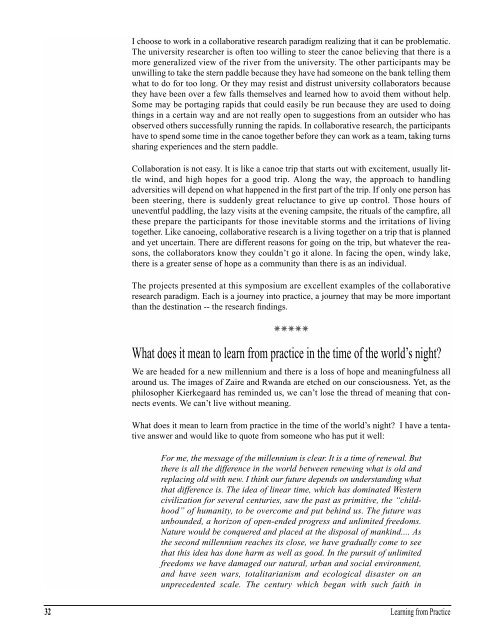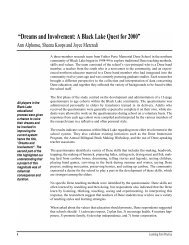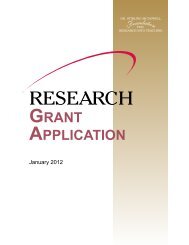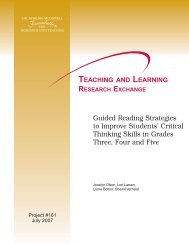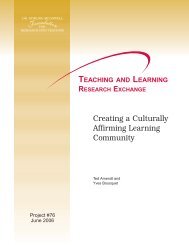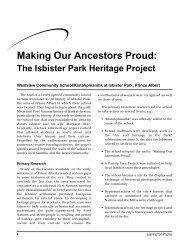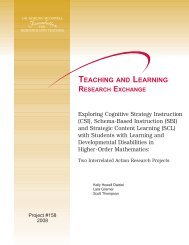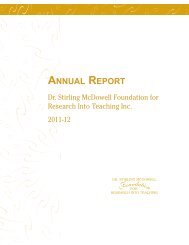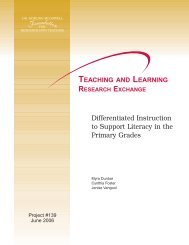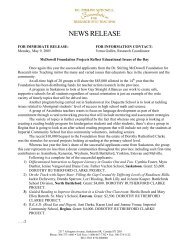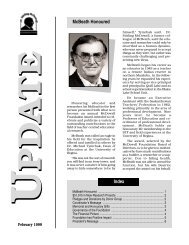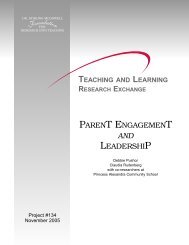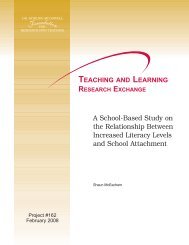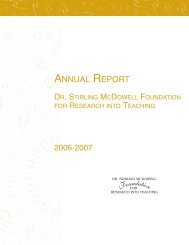Research Bulletin, Vol. 1, No. 2, 1996 - Dr. Stirling McDowell ...
Research Bulletin, Vol. 1, No. 2, 1996 - Dr. Stirling McDowell ...
Research Bulletin, Vol. 1, No. 2, 1996 - Dr. Stirling McDowell ...
Create successful ePaper yourself
Turn your PDF publications into a flip-book with our unique Google optimized e-Paper software.
I choose to work in a collaborative research paradigm realizing that it can be problematic.The university researcher is often too willing to steer the canoe believing that there is amore generalized view of the river from the university. The other participants may beunwilling to take the stern paddle because they have had someone on the bank telling themwhat to do for too long. Or they may resist and distrust university collaborators becausethey have been over a few falls themselves and learned how to avoid them without help.Some may be portaging rapids that could easily be run because they are used to doingthings in a certain way and are not really open to suggestions from an outsider who hasobserved others successfully running the rapids. In collaborative research, the participantshave to spend some time in the canoe together before they can work as a team, taking turnssharing experiences and the stern paddle.Collaboration is not easy. It is like a canoe trip that starts out with excitement, usually littlewind, and high hopes for a good trip. Along the way, the approach to handlingadversities will depend on what happened in the first part of the trip. If only one person hasbeen steering, there is suddenly great reluctance to give up control. Those hours ofuneventful paddling, the lazy visits at the evening campsite, the rituals of the campfire, allthese prepare the participants for those inevitable storms and the irritations of livingtogether. Like canoeing, collaborative research is a living together on a trip that is plannedand yet uncertain. There are different reasons for going on the trip, but whatever the reasons,the collaborators know they couldn’t go it alone. In facing the open, windy lake,there is a greater sense of hope as a community than there is as an individual.The projects presented at this symposium are excellent examples of the collaborativeresearch paradigm. Each is a journey into practice, a journey that may be more importantthan the destination -- the research findings.✵✵✵✵✵What does it mean to learn from practice in the time of the world’s night?We are headed for a new millennium and there is a loss of hope and meaningfulness allaround us. The images of Zaire and Rwanda are etched on our consciousness. Yet, as thephilosopher Kierkegaard has reminded us, we can’t lose the thread of meaning that connectsevents. We can’t live without meaning.What does it mean to learn from practice in the time of the world’s night? I have a tentativeanswer and would like to quote from someone who has put it well:For me, the message of the millennium is clear. It is a time of renewal. Butthere is all the difference in the world between renewing what is old andreplacing old with new. I think our future depends on understanding whatthat difference is. The idea of linear time, which has dominated Westerncivilization for several centuries, saw the past as primitive, the “childhood”of humanity, to be overcome and put behind us. The future wasunbounded, a horizon of open-ended progress and unlimited freedoms.Nature would be conquered and placed at the disposal of mankind.... Asthe second millennium reaches its close, we have gradually come to seethat this idea has done harm as well as good. In the pursuit of unlimitedfreedoms we have damaged our natural, urban and social environment,and have seen wars, totalitarianism and ecological disaster on anunprecedented scale. The century which began with such faith in32Learning from Practice


